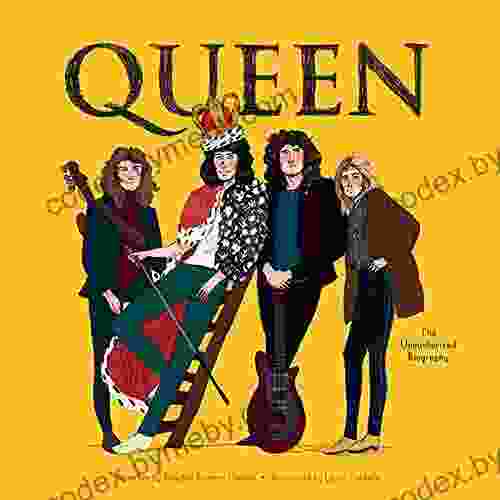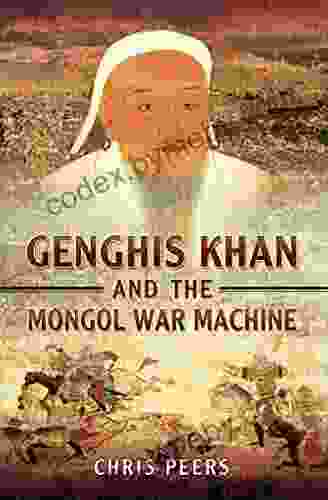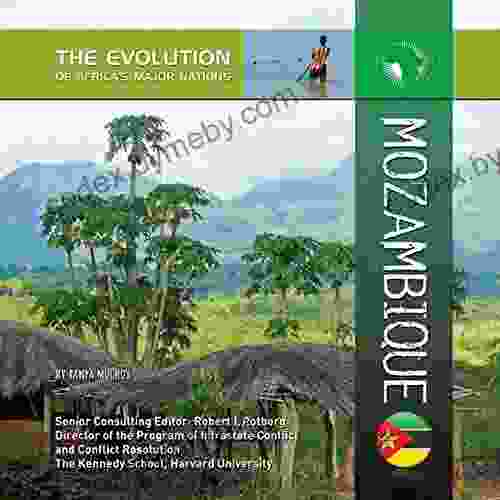Genghis Khan and the Mongol War Machine: The Story of the World's Greatest Conqueror

Genghis Khan is one of the most famous and influential figures in history. He was the founder and first Great Khan of the Mongol Empire, which at its peak stretched from the Pacific Ocean to the Caspian Sea. Genghis Khan was a brilliant military strategist and tactician, and his armies were known for their ferocity and discipline. He conquered vast territories and established one of the largest empires in history.
4.5 out of 5
| Language | : | English |
| File size | : | 20949 KB |
| Text-to-Speech | : | Enabled |
| Screen Reader | : | Supported |
| Enhanced typesetting | : | Enabled |
| Word Wise | : | Enabled |
| Print length | : | 239 pages |
| Lending | : | Enabled |
Genghis Khan was born in 1162 in what is now Mongolia. He was the son of a minor chieftain, and he spent his early years fighting for control of his father's tribe. In 1206, he was elected Great Khan of the Mongols, and he quickly began to unite the Mongol tribes under his rule. He then launched a series of military campaigns that would eventually lead to the creation of the Mongol Empire.
Genghis Khan's armies were incredibly effective in battle. They were highly mobile and disciplined, and they used a variety of tactics to defeat their enemies. They were also ruthless in their treatment of conquered peoples. Genghis Khan believed that the best way to maintain control was to terrorize his enemies, and he often Free Downloaded the wholesale slaughter of entire populations.
Despite his brutal tactics, Genghis Khan was also a skilled administrator and lawmaker. He established a uniform legal code for the Mongol Empire, and he promoted trade and commerce. He also tolerated religious diversity, and he allowed his subjects to practice their own religions.
Genghis Khan died in 1227, but his empire continued to expand under his successors. By the end of the 13th century, the Mongol Empire controlled most of Asia and parts of Europe. The Mongol Empire eventually collapsed in the 14th century, but it left a lasting legacy on the world. The Mongol conquests helped to spread new ideas and technologies across Eurasia, and they played a major role in the development of the modern world.
Genghis Khan's Military Genius
Genghis Khan was a brilliant military strategist and tactician. He was able to unite the Mongol tribes under his rule and lead them to victory over vast swaths of Asia and Europe. His armies were known for their ferocity and discipline, and they used a variety of tactics to defeat their enemies.
One of Genghis Khan's greatest strengths was his ability to adapt to different situations. He was able to defeat a wide variety of enemies, from the nomadic tribes of the steppes to the heavily fortified cities of China. He was also able to learn from his mistakes and improve his tactics over time.
Genghis Khan also had a keen eye for talent. He was able to identify and promote skilled generals and administrators, and he gave them the freedom to lead his armies and govern his empire. This allowed him to focus on the overall strategy of his campaigns, and it helped to ensure the success of his empire.
The Mongol War Machine
The Mongol war machine was one of the most effective fighting forces in history. It was based on a combination of mobility, discipline, and firepower. The Mongols were able to travel long distances quickly and easily, and they were able to launch surprise attacks on their enemies.
The Mongols were also highly disciplined. They were trained to obey their commanders without question, and they were always ready to fight. They were also very tough and resilient, and they were able to withstand long periods of hardship.
Finally, the Mongols had a variety of powerful weapons, including bows and arrows, swords, and spears. They were also skilled in using siege engines, and they were able to quickly and effectively breach enemy fortifications.
The Legacy of Genghis Khan
Genghis Khan died in 1227, but his empire continued to expand under his successors. By the end of the 13th century, the Mongol Empire controlled most of Asia and parts of Europe. The Mongol Empire eventually collapsed in the 14th century, but it left a lasting legacy on the world.
The Mongol conquests helped to spread new ideas and technologies across Eurasia. They also played a major role in the development of the modern world. For example, the Mongols introduced gunpowder to Europe, and they helped to spread the use of paper money. They also established a vast trade network that connected East and West.
Genghis Khan was a complex and controversial figure. He was a brilliant military strategist and conqueror, but he was also a ruthless and brutal ruler. However, there is no doubt that he was one of the most influential figures in history. His conquests changed the course of world history, and his legacy continues to be felt today.
Genghis Khan and the Mongol War Machine is a fascinating and informative account of the life and conquests of the world's greatest conqueror. This book provides a fresh and comprehensive look at Genghis Khan's military genius, the Mongol war machine, and the legacy of the Mongol Empire. It is a must-read for anyone interested in history, biography, or military affairs.
Buy the book now
4.5 out of 5
| Language | : | English |
| File size | : | 20949 KB |
| Text-to-Speech | : | Enabled |
| Screen Reader | : | Supported |
| Enhanced typesetting | : | Enabled |
| Word Wise | : | Enabled |
| Print length | : | 239 pages |
| Lending | : | Enabled |
Do you want to contribute by writing guest posts on this blog?
Please contact us and send us a resume of previous articles that you have written.
 Book
Book Novel
Novel Page
Page Chapter
Chapter Text
Text Story
Story Genre
Genre Reader
Reader Library
Library Paperback
Paperback E-book
E-book Magazine
Magazine Newspaper
Newspaper Paragraph
Paragraph Sentence
Sentence Bookmark
Bookmark Shelf
Shelf Glossary
Glossary Bibliography
Bibliography Foreword
Foreword Preface
Preface Synopsis
Synopsis Annotation
Annotation Footnote
Footnote Manuscript
Manuscript Scroll
Scroll Codex
Codex Tome
Tome Bestseller
Bestseller Classics
Classics Library card
Library card Narrative
Narrative Biography
Biography Autobiography
Autobiography Memoir
Memoir Reference
Reference Encyclopedia
Encyclopedia Clare Chase
Clare Chase Chip Coffey
Chip Coffey Christopher Menkhaus
Christopher Menkhaus Michael B Druxman
Michael B Druxman Christina Kim
Christina Kim Cindy Arledge
Cindy Arledge Chris Hutchins
Chris Hutchins Chris Ryan
Chris Ryan Kathleen Flinn
Kathleen Flinn Alexandra Silber
Alexandra Silber Jake Wood
Jake Wood Christelle Damiens
Christelle Damiens Scott Wilson
Scott Wilson Joshua Hammer
Joshua Hammer Karen Speerstra
Karen Speerstra Putri Pascualy
Putri Pascualy Russell Staiff
Russell Staiff Christine Meunier
Christine Meunier James Morgan Ayres
James Morgan Ayres Christie Cognevich
Christie Cognevich
Light bulbAdvertise smarter! Our strategic ad space ensures maximum exposure. Reserve your spot today!
 Jeremy CookFollow ·9k
Jeremy CookFollow ·9k Cruz SimmonsFollow ·8.5k
Cruz SimmonsFollow ·8.5k Clay PowellFollow ·19.5k
Clay PowellFollow ·19.5k Quincy WardFollow ·19k
Quincy WardFollow ·19k Esteban CoxFollow ·16.7k
Esteban CoxFollow ·16.7k Vernon BlairFollow ·12.4k
Vernon BlairFollow ·12.4k Alexandre DumasFollow ·19.9k
Alexandre DumasFollow ·19.9k Carson BlairFollow ·7.3k
Carson BlairFollow ·7.3k

 Rick Nelson
Rick NelsonThe Power of Positivity: 51 Motivational Quotes to...
In the tapestry of life, we encounter...

 Lee Simmons
Lee SimmonsThe Indian War of 1864: A Devastating Conflict in the...
The Indian War of 1864 was a brutal...

 Eddie Bell
Eddie BellQueen: The Unauthorized Biography: Unraveling the Secrets...
Prepare to delve into the captivating...

 Dion Reed
Dion ReedUnveiling the Imperfect Gems of Trauma and...
In the tapestry of...

 Desmond Foster
Desmond FosterThirty-Six Years in the Rockies: A Timeless Masterpiece...
A Journey Through Time and...
4.5 out of 5
| Language | : | English |
| File size | : | 20949 KB |
| Text-to-Speech | : | Enabled |
| Screen Reader | : | Supported |
| Enhanced typesetting | : | Enabled |
| Word Wise | : | Enabled |
| Print length | : | 239 pages |
| Lending | : | Enabled |














